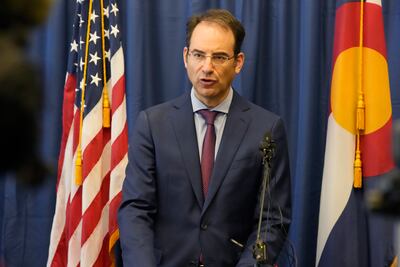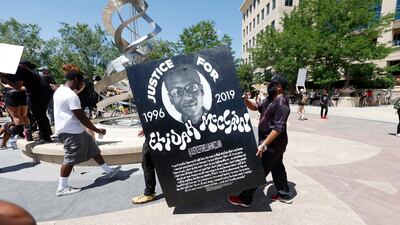Three suburban Denver police officers and two paramedics have been indicted on manslaughter and other charges in the death of Elijah McClain, a black man who died after being put in a chokehold and injected with a powerful sedative two years ago, Colorado Attorney General Phil Weiser said on Wednesday.
“Each of the five defendants face one count of manslaughter and one count of criminally negligent homicide,” said Mr Weiser, who headed the investigation.
Four of the accused face further assault charges, including the two paramedics over their use of a powerful sedative on McClain without consent.
“We're here today because Elijah McClain is not here, and he should be,” Mr Weiser said.
The 23-year-old’s death gained widespread attention during last year’s protests against racial injustice and police brutality following the killing of George Floyd in Minneapolis, Minnesota.
McClain died in August 2019 in Aurora, near Denver, three days after he was put in a chokehold by police and injected with ketamine, and thereafter suffering cardiac arrest.

Within five minutes, he stopped breathing, a federal lawsuit filed by McClain’s family said. He was later declared brain dead and taken off life support.
Police had responded to a call about a “suspicious” black man “acting weird” in the street and wearing a ski mask.
Police body camera footage shows an officer approaching McClain on the pavement and saying, “I have a right to stop you because you’re being suspicious.”
Colorado attorney general
The officer turns McClain around and says, “Relax, or I’m going to have to change this situation.” As the other officers help restrain McClain, he asks them to let him go, saying, “You guys started to arrest me, and I was stopping my music to listen.”
The officers’ body cameras come off as they move McClain to the grass, but an officer can be heard saying McClain grabbed one of their guns. McClain tries to explain and sometimes cries out or sobs. He says he can’t breathe and was only trying to walk home.
“I’m just different. I’m just different, that’s all. That’s all I was doing. I’m so sorry. I have no gun. I don’t do that stuff. I don’t do any fighting. Why were you attacking me? I don’t do guns. I don’t even kill flies,” he said.
One officer eventually retrieves his camera, which shows McClain handcuffed, lying on his side and periodically vomiting as another officer leans on him.
The family’s lawsuit alleges McClain died as a result of a dramatic increase of lactic acid in his blood caused by excessive force used by police over about 18 minutes, combined with the effects of the ketamine.
They claim that police continued to “torture” McClain even after he was restrained, treatment they say is a result of the department’s history of “unconstitutional racist brutality".
Colorado Governor Jared Polis appointed Mr Weiser to head the investigation into McClain's death in June 2020, saying at the time he had been “moved” after speaking with the victim's mother, Sheneen.
“He was a son, a nephew, a brother and a friend. When he died, he was only 23 years old. He had his whole life ahead of him,” Mr Weiser said on Wednesday.




















